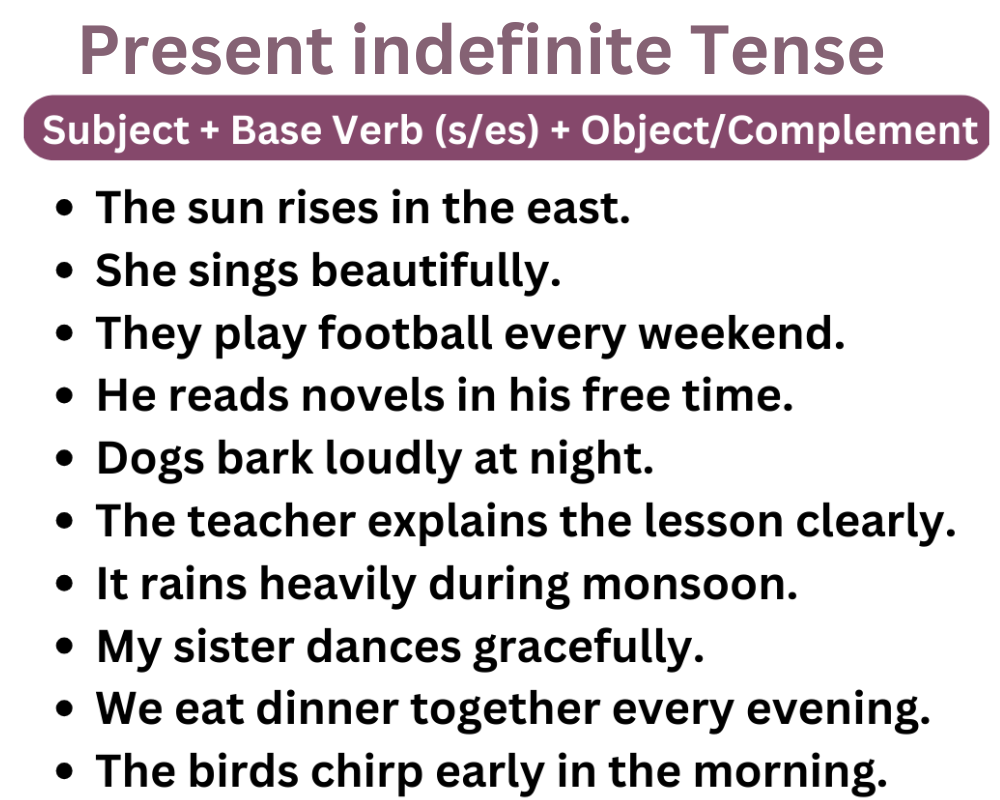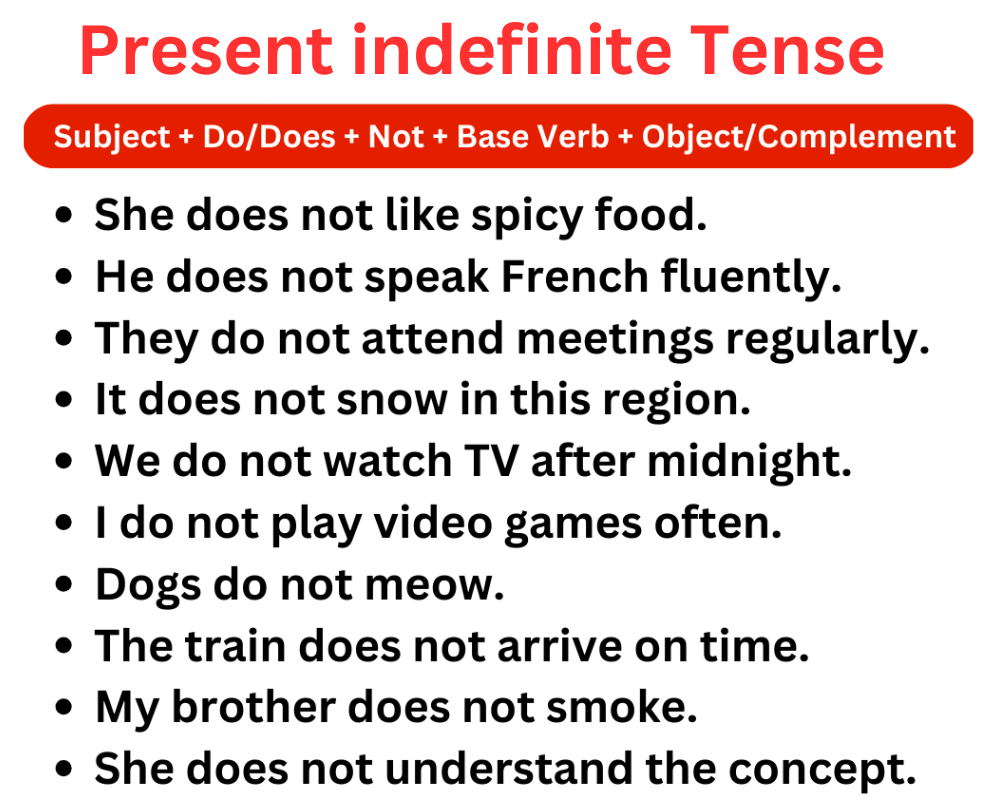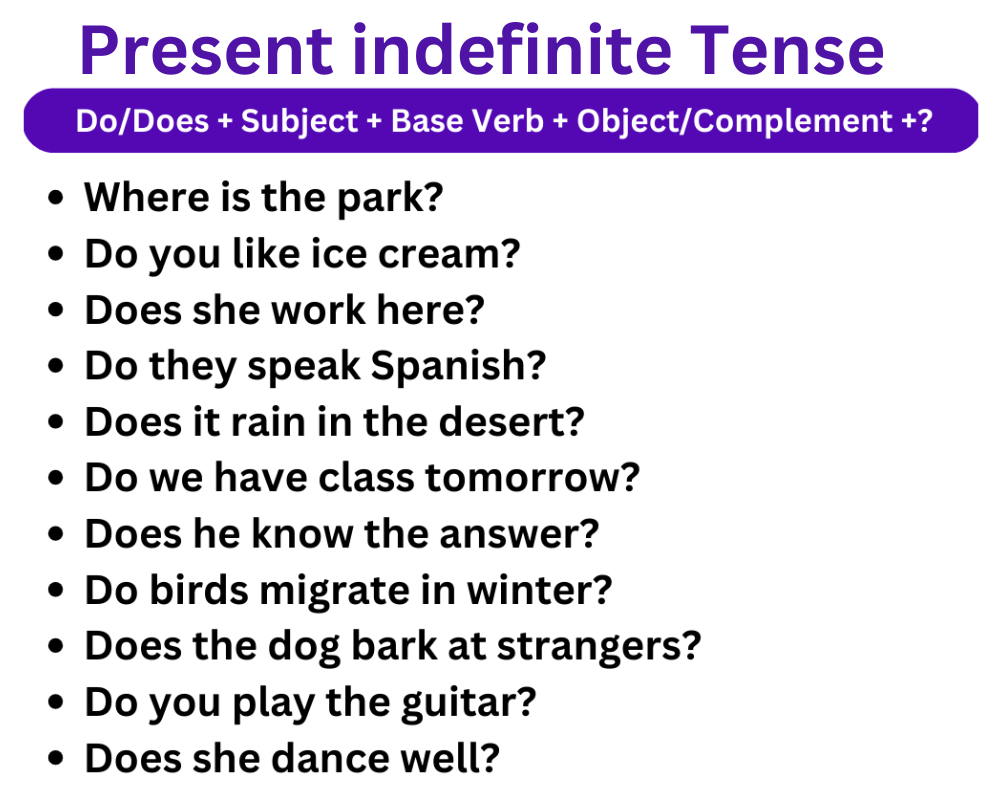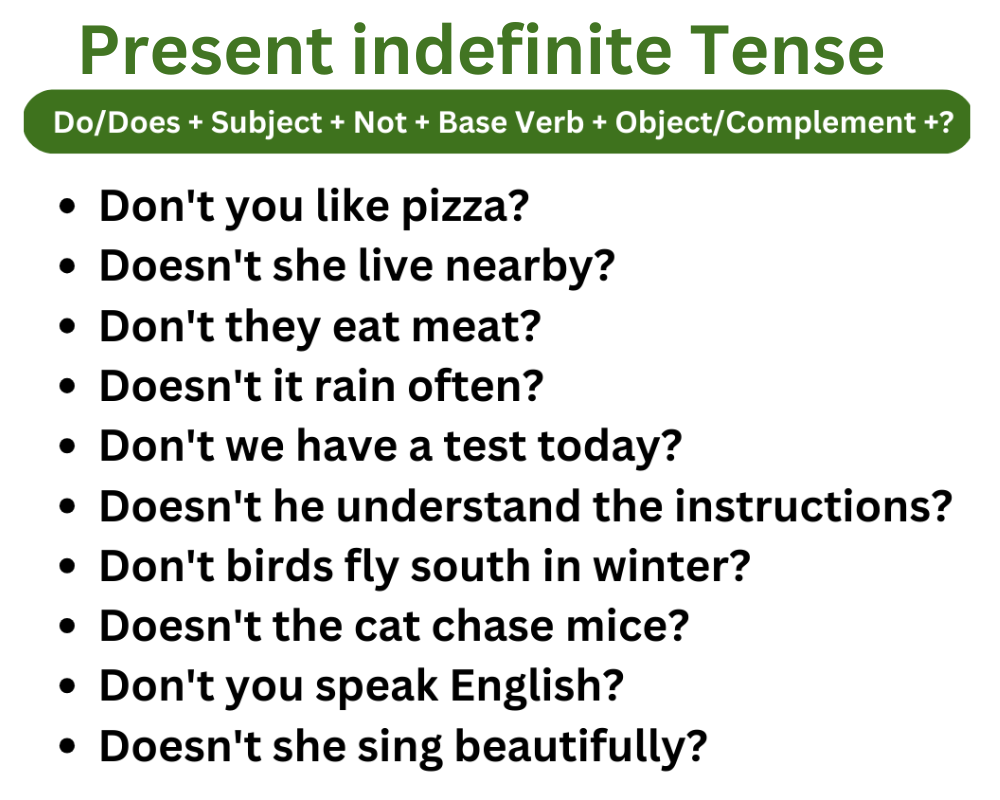Welcome to our exciting compilation of examples showcasing the Present Indefinite Tense in English! Also referred to as the Present Simple, this collection features a variety of example sentences that illustrate this tense. In this article, we will explore four distinct types of Present Indefinite Tense sentences: Positive, Negative, Interrogative, and Negative Interrogative. To make it easier for you to grasp these examples, we’ve included the sentence structure beforehand. Whether you’re a language enthusiast, a curious learner, or a student eager to enhance your English skills, this collection is tailored just for you! So without further ado, let’s jump right into our examples of the Present Indefinite Tense.
Present indefinite Tense Examples Sentences:
20 Positive Sentences of Present Indefinite Tense:
Sentences Structure: Subject + Base Verb (s/es) + Object/Complement
- The sun set in the west.
- He sings beautifully.
- Do you like cold drink?
- They play volleyball every weekend.
- He reads book in his free time.
- Does she work in a factory?
- Dogs bark loudly at strangers.
- We have a lecture tomorrow.
- It rains heavily during summer.
- My sister debates gracefully.
- Don’t you like burger?
- We eat dinner with family every evening.
- Cats sleep on bed.
- He knows the question.
- Birds migrate in winter to the hot country.
- She sings well.
- The birds chirp sweet in the morning.
- We watch stage drama on Fridays.
- She lives nearby me.
- Dogs play with bal in the park.

20 Negative Sentences of Present Indefinite Tense:
Sentences Structure: Subject + Do/Does + Not + Base Verb + Object/Complement
- She does not like sweet dish.
- He does not speak Korean fluently.
- Don’t you like fast food?
- They do not attend classes regularly.
- It does not snow in this city.
- Cats don’t meow.
- She doesn’t live nearby her.
- We do not watch TV early in the morning.
- I do not play games often.
- The bus doesn’t arrive on time.
- Dogs don’t bark at strangers.
- My brother does not drink.
- They don’t eat beef.
- Birds don’t swim underwater.
- He doesn’t understand the lecture.
- We don’t have class today.
- She doesn’t work there anymore.
- It doesn’t rain in the summer.
- I don’t like tea.
- They don’t play football.

Twenty interrogative sentences of Present Indefinite Tense:
Sentences Structure: Do/Does + Subject + Base Verb + Object/Complement +?Do you like ice cream?
- Does he work here?
- Don’t we like pizza?
- Does it rain in the desert?
- Do we have meeting tomorrow?
- Don’t they eat beef?
- Does he know the question?
- Do birds migrate in winter to other place?
- Don’t you play the piano?
- Does she sing well?
- Aren’t you coming to the birthday party?
- Doesn’t it snow in summer?
- Do cats sleep much?
- Don’t you like oily food?
- Does she have a bike?
- Don’t dogs bark at cats?
- Does he like dancing?
- Do you have any birds?
- Doesn’t she live nearby her?
- Do you drink juice in the morning?
- Do you have any jewellery.

20 Negative Interrogative Sentences of Present Indefinite Tense:
Sentences Structure: Do/Does + Subject + Not + Base Verb + Object/Complement +?
- Don’t you like fast food?
- Doesn’t she live nearby him?
- Don’t they eat beef?
- Doesn’t it cold often?
- Don’t we have a match today?
- Aren’t you coming to the class?
- Doesn’t he speak Korean fluently?
- Don’t cats chase chick?
- Aren’t they going on picnic?
- Doesn’t she work there anymore?
- Don’t you play the piano?
- Doesn’t it snow in summer?
- Don’t dogs bark at cats?
- Aren’t you feeling sad?
- Doesn’t she understand the lecture?
- Don’t birds migrate south for the summer?
- Aren’t you tired of waiting train?
- Doesn’t he know the question?
- Don’t you like oily food?
- Aren’t they coming to the party?

FAQs
- What is the present indefinite tense with examples?
The present indefinite tense, also known as the simple present tense, is used to describe habitual actions, general truths, or regular occurrences. It’s super easy to grasp! In this tense, we typically use the base form of the verb for most subjects. For example, “She reads every morning” or “They play soccer on weekends.
- What is the rule of simple present tense?
The simple present tense is one of the most fundamental and widely used verb tenses in English! It’s primarily used to describe habits, general truths, and repeated actions. For example, when you say, I eat breakfast every morning, you’re using the simple present to express a routine. Isn’t it amazing how this tense can convey so much about our daily lives. Structure: Subject + Base Form of Verb (add “s” or “es” for third-person singular)
What is an example of a simple present tense?
The present tense is the base form of the verb:
- I work in London.
- She works in London.
- I’m nineteen years old. …
Conclusions
The present indefinite tense is a powerful tool for expressing routine actions and general truths in our daily lives. By using simple structures, such as She walks to school every day or They play soccer on weekends, we can effectively communicate our habits and preferences. Mastering these sentences not only enhances your language skills but also allows you to connect with others more effortlessly. So why not practice forming your own examples today? Dive into the world of present indefinite tense and watch your communication flourish.
